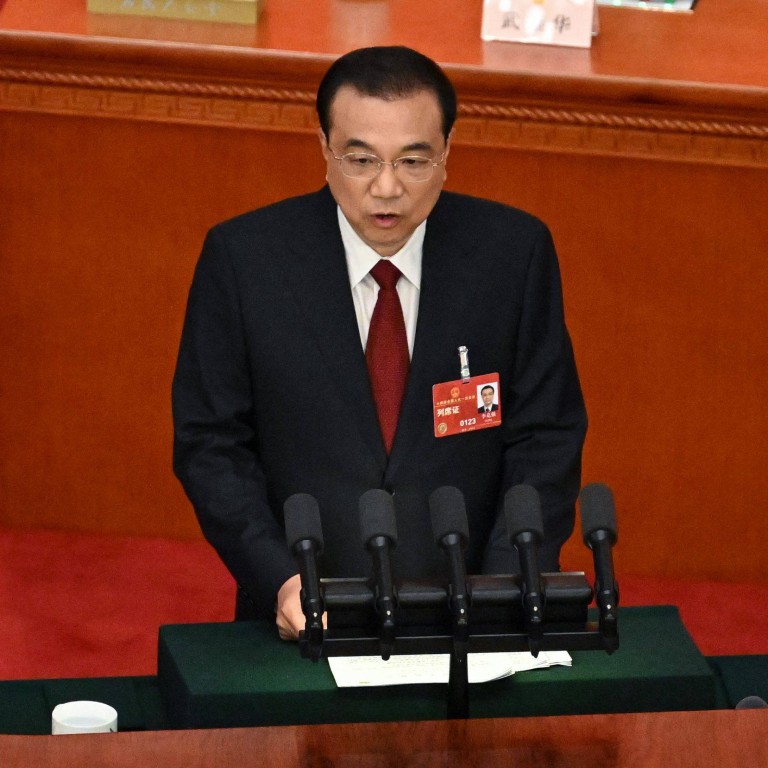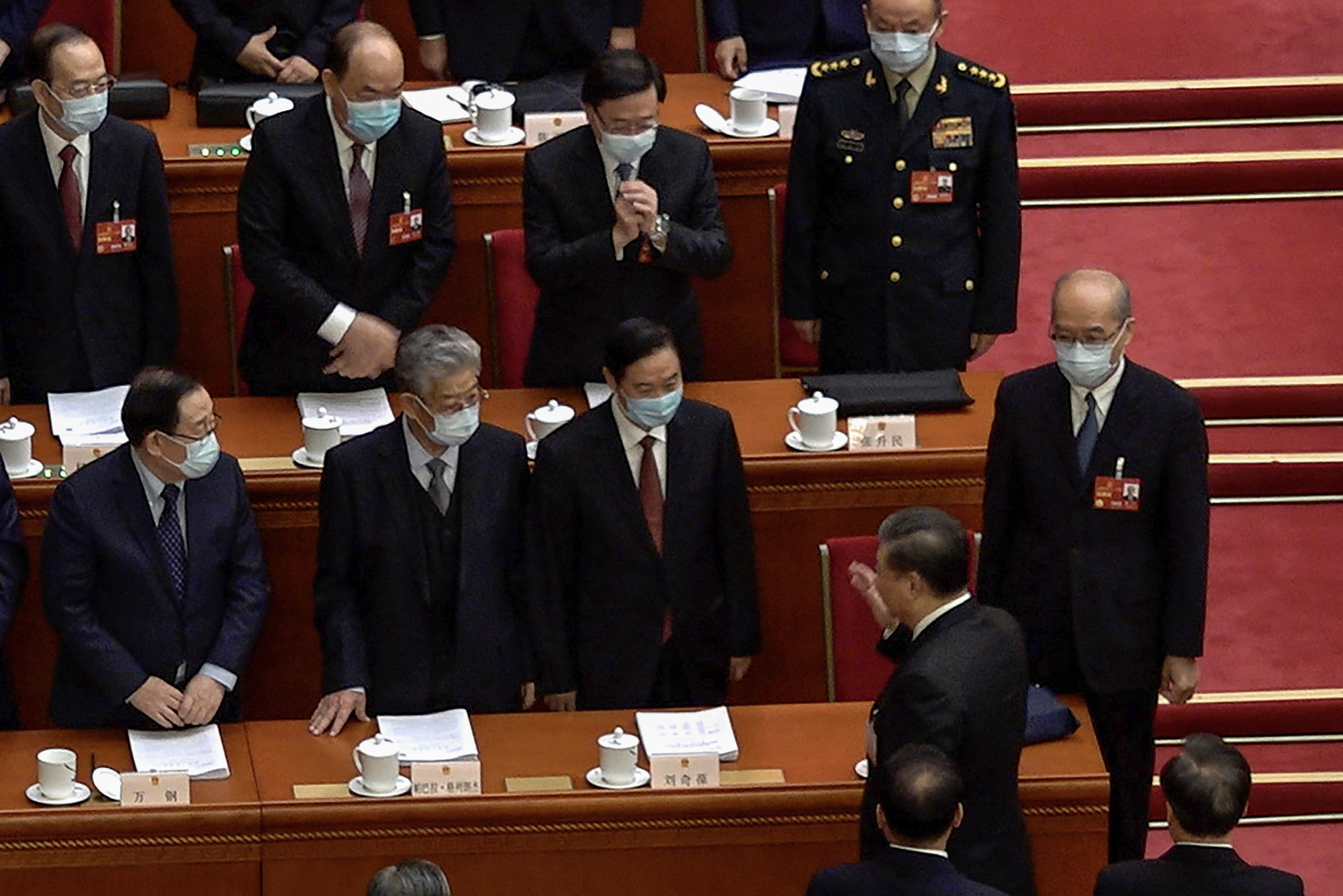
Hong Kong ‘set to thrive’, Chinese premier says as he pledges Beijing’s support and points to Greater Bay Area opportunities
- Delivering his final work report, Li Keqiang also underscores need to uphold constitutional order in Hong Kong and principle of patriots administering local affairs
- City leader John Lee says administration will strive to expand economy by seizing opportunities offered by bay area blueprint and Belt and Road Initiative
The outgoing leader also underscored the need to uphold the constitutional order in Hong Kong and the principle of patriots administering local affairs, after noting Beijing had exercised effective jurisdiction over the city with the enactment of the national security law and the reform of its electoral system.
Li said the “one country, two systems” governing policy should be “fully, faithfully, and resolutely” implemented with a high degree of autonomy for Hong Kong.

Li’s speech was welcomed by delegates and political analysts as a sign that residents should feel confident the city could expand its economy in new directions given Beijing’s vow of increased support.
Li pledged Beijing would support the two cities’ economic growth, maintain their long-term prosperity and stability, and improve the livelihood of their residents. He also highlighted “fresh progress” made in the financial centre.
“The Hong Kong government is grateful for the central government’s staunch support,” he wrote.
“It will remain committed to the letter and spirit of the one country, two systems policy and make the most of the principle of patriots administering Hong Kong, in a bid to speed up the city’s economic development, to improve residents’ life and to boost Hong Kong’s international competitiveness.”
The bay area is a national-level development blueprint that lays out strategies to unite nine Guangdong provincial cities with Hong Kong and Macau into an economic powerhouse and innovation and technology hub. Li has mentioned the plan in each of his work reports since its first inclusion in 2017.
The Belt and Road Initiative is an economic framework designed to connect China with economies in East Asia and Europe.
Hong Kong delegates urged to take more active role in developing Greater Bay Area
Zheng Yanxiong, the head of the central government’s liaison office, attended a meeting with Hong Kong NPC deputies to discuss the work report on Sunday afternoon.
Zheng said Hong Kong should make the most of the advantages offered by the one country, two systems policy, stressing that only through firmly upholding the “one country” could the “two systems” function properly and bring about benefits for the city.
He also stressed his office would continue to support Hong Kong in maintaining its common law system to foster greater links with jurisdictions in developed countries, while also helping it to raise its international profile and maximise its attraction to foreign investors, customers and innovators through the city’s cultural inclusiveness.
Hong Kong’s No 2 official Eric Chan Kwok-ki said Li’s report made it clear the city should develop its economy in the post-pandemic era and the local government was confident in uniting society to realise the goal.
“I believe different sectors in Hong Kong will work closely with the government to attract investment and talent, as well as to solve deep-rooted problems in housing, poverty and medical care,” the chief secretary wrote on social media.
Tam Yiu-chung, Hong Kong’s sole member of the NPC Standing Committee, said he believed the central government would provide additional support for the city’s growth.
“I would like the Hong Kong public to pay particular attention to the central government’s vow to unswervingly support the micro, small and medium-sized enterprises, and to attract more foreign investment,” said Tam, referring to two key priorities Li listed in his report.
Beijing’s top Hong Kong office to report directly to Communist Party leaders
CPPCC member Henry Tang Ying-yen described Li’s pledges as a shot in the arm for Hong Kong’s economy.
“The country has vowed to double down on its efforts to attract foreign investment, and Hong Kong can tap into that as the city is an international financial hub,” he said.
Tang added he planned to propose that the central government ease mainland China’s investment rules for overseas entities, including lowering the entry threshold under the Qualified Foreign Limited Partnership (QFLP) mechanism.
As of the end of 2021, there were 122 Hong Kong-funded QFLP enterprises in the Qianhai economic zone, managing funds totalling 40 billion yuan (US$5.1 billion), according to government data.
Lau Siu-kai, a consultant at the semi-official Chinese Association of Hong Kong and Macau Studies think tank, noted how statements on the financial centre in the annual work reports had evolved in recent years, shifting from an emphasis on order to prosperity and from politics to economy.
“That’s the reason why wordings on Hong Kong have been shortened in the report,” Lau said. “The foundation for fully and faithfully implementing the one country, two systems has been made as Hong Kong is now administered by patriots.”
He added: “Now it’s the Hong Kong government’s turn to enhance patriots capability to govern and develop Hong Kong.”
Veteran political observer James Sung Lap-kung, of the Hong Kong Progress and Perfection Research Institute, agreed.
“I think the central government has been positive on Hong Kong’s political environment,” he said. “You see Xi waved to Lee. That’s rarely seen in previous NPC meetings. That shows the Chinese leader’s recognition of Lee and Hong Kong.”
He also argued Beijing had high expectations that Hong Kong would attract more foreign investment to the mainland, calling Lee’s Middle East visit a good starting point.

